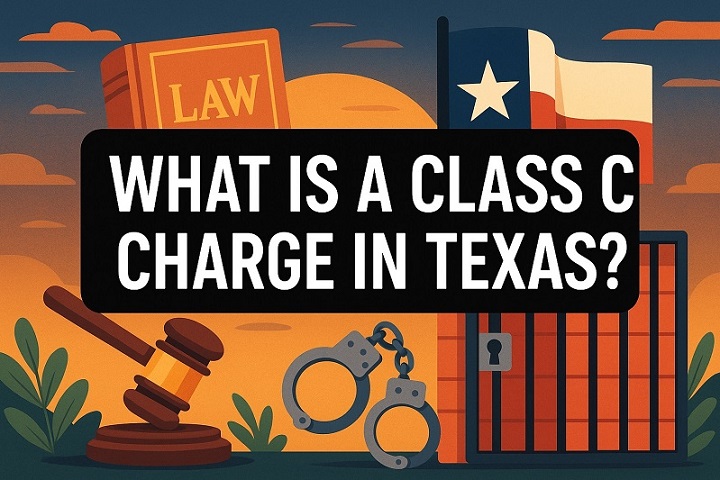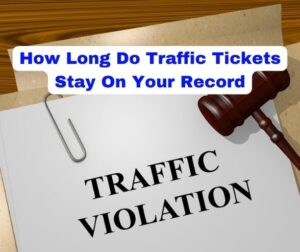In Texas, criminal offenses are classified by severity from the most serious felonies to the least severe misdemeanors. Among these, Class C misdemeanors represent the lowest level of criminal charge under state law. Though often overlooked due to their minor penalties, they are still legally considered criminal offenses and can carry consequences beyond a simple fine.
Class C charges are frequently issued for common, everyday violations such as speeding, public intoxication, or minor theft. These cases are typically handled in municipal or justice courts and resolved through a citation, often without requiring a formal arrest. Despite their informal appearance, handling a Class C charge improperly such as ignoring it or simply paying the fine can result in a permanent criminal record.
Understanding how these charges work is essential, especially for individuals unfamiliar with the Texas legal system or those facing their first offense. While the consequences may seem small compared to higher-level crimes, Class C misdemeanors can still affect your employment, driving privileges, or eligibility for certain licenses. Knowing your rights and legal options can make a significant difference in how a charge impacts your life.
This article breaks down everything you need to know about Class C charges in Texas from legal definitions and common examples to court procedures and long-term effects. Whether you’re dealing with a citation or trying to help someone navigate the process, this guide is designed to provide clarity and confidence when facing these low-level yet impactful charges.
Highlights
Overview of Criminal Charge Classes in Texas
 The Texas Penal Code divides criminal offenses into two primary categories: misdemeanors and felonies. This classification system helps determine the severity of an offense and the potential penalties an individual may face. Misdemeanors are generally considered less serious and are handled in county-level courts, while felonies involve more serious conduct and are prosecuted at the district court level.
The Texas Penal Code divides criminal offenses into two primary categories: misdemeanors and felonies. This classification system helps determine the severity of an offense and the potential penalties an individual may face. Misdemeanors are generally considered less serious and are handled in county-level courts, while felonies involve more serious conduct and are prosecuted at the district court level.
Misdemeanors in Texas are broken into three classes: A, B, and C. Class A misdemeanors are the most serious of the group and can result in up to one year in county jail, along with a fine. Class B misdemeanors carry lighter penalties but may still involve jail time. Class C misdemeanors are the lowest-level criminal offenses, punishable by a fine only, without any jail time.
Felonies are classified into five levels, ranging from state jail felonies to capital felonies. These charges can carry penalties from 180 days in state jail to life imprisonment or even the death penalty in the most severe cases. Felonies typically involve serious harm, repeat offenses, or threats to public safety and carry long-term consequences such as loss of civil rights and more extensive criminal records.
Here is a simplified breakdown of Texas criminal charge classes:
| Charge Type | Classification | Penalty | Example Offenses |
|---|---|---|---|
| Misdemeanor | Class A | Up to 1 year in jail + $4,000 fine | Assault causing injury, theft ($750–$2,500) |
| Misdemeanor | Class B | Up to 180 days in jail + $2,000 fine | First-time DWI, marijuana possession (<2 oz) |
| Misdemeanor | Class C | Fine up to $500, no jail | Speeding, public intoxication, theft under $100 |
| Felony | State Jail Felony | 180 days–2 years in state jail + $10,000 fine | Theft ($2,500–$30,000), credit card abuse |
| Felony | Third-Degree | 2–10 years in prison + $10,000 fine | Possession of a firearm by a felon, DWI (3rd offense) |
| Felony | Second-Degree | 2–20 years in prison + $10,000 fine | Aggravated assault, sexual assault |
| Felony | First-Degree | 5–99 years or life + $10,000 fine | Aggravated robbery, large-scale drug trafficking |
| Felony | Capital Felony | Life without parole or death penalty | Capital murder |
Understanding where a charge falls on this spectrum is critical for preparing a defense, negotiating a plea deal, or evaluating the long-term consequences. Even the lowest-level misdemeanor can have serious implications, while a felony charge can permanently alter someone’s rights and future opportunities.
Legal Definition of a Class C Misdemeanor
Under Texas law, a Class C misdemeanor is defined as a criminal offense that is punishable by a fine not exceeding $500. It is the lowest level of misdemeanor in the state and does not carry the possibility of jail time. Despite its minimal penalties, a Class C offense is still considered a criminal charge and can appear on your permanent record if not dismissed or expunged.
These offenses are typically issued through citations rather than formal arrests. When a law enforcement officer cites someone for a Class C violation, it usually includes a date to respond to the charge—either by entering a plea or appearing in court. The case is then handled in a municipal or justice of the peace court, depending on where the offense occurred. Many Class C charges are resolved without an in-person court appearance.
While the legal process may seem simple, the consequences of a Class C conviction can be more complex. Pleading guilty and paying the fine may seem like the easiest option, but it results in a conviction that could impact employment, insurance, and background checks. This is especially important for minors, students, or anyone applying for professional licenses.
Examples of Class C misdemeanors include speeding, disorderly conduct, public intoxication, minor in possession of alcohol, and theft under $100. Though these may appear minor, they can carry unexpected repercussions if not properly addressed. For many people, seeking dismissal through deferred disposition or pursuing expunction after resolution is a safer path toward protecting their record.
Common Examples of Class C Charges in TX
Class C misdemeanors include a wide range of common but minor infractions. They’re usually citation-based and avoid arrest, yet failure to resolve them can lead to serious repercussions.
| Offense | Description | Max Fine |
|---|---|---|
| Speeding | Driving above posted speed limits | $500 |
| Public Intoxication | Intoxicated in public | $500 |
| Minor in Possession of Alcohol | Underage alcohol possession | $500 |
| Theft Under $100 | Low-value theft | $500 |
| Disorderly Conduct | Offensive public behavior | $500 |
Even minor convictions can complicate job applications, housing, loans, or license renewals. Many defendants don’t realize paying the fine equals a criminal conviction.
Whenever possible, options like deferred disposition or defensive driving programs may help keep your record clean. These are especially valuable for younger individuals or some professions.
Court Process for a Class C Charge
When someone receives a Class C misdemeanor in Texas, the legal process usually begins with a citation issued by a law enforcement officer. This citation acts as a formal notice to appear in court or respond by a specific date. Unlike higher-level offenses, Class C charges typically do not involve arrest or booking unless the person fails to respond or comply with the court’s instructions.
The next step is entering a plea. Defendants can usually choose from three options: guilty, no contest (nolo contendere), or not guilty. Pleas may be submitted in person, by mail, online, or through an attorney—depending on the court. Pleading guilty or no contest usually results in a fine, while pleading not guilty sets the case for trial. For those who want to avoid a conviction, the court may offer alternatives such as deferred disposition or a dismissal upon meeting certain conditions.
If a defendant fails to take action by the appearance date, the consequences can escalate quickly. Courts may issue a warrant for arrest, add fees to the original fine, or report the case to the Department of Public Safety, which could lead to a driver’s license hold or suspension. Even though Class C offenses do not carry jail time as a sentence, failing to appear in court can result in being taken into custody on a warrant.
Class C cases are typically resolved in justice of the peace or municipal courts, which are designed to handle large volumes of minor offenses. These courts are more informal than district or county courts and often provide options for resolving cases without lengthy trials. Still, it’s important for defendants to understand the long-term effects of their decisions, as even a minor charge can leave a lasting mark on their record if not handled correctly.
Consequences Beyond the Fine
Although a Class C misdemeanor in Texas does not result in jail time, the consequences can extend far beyond simply paying a fine. Many people believe that once the citation is paid, the matter is closed. In reality, paying the fine is legally treated as a guilty plea, which leads to a conviction and places the offense on your criminal record—potentially visible to employers, landlords, and licensing agencies.
One of the most overlooked consequences is the impact on background checks. Even a minor conviction like public intoxication or disorderly conduct can raise red flags for employers conducting pre-employment screenings. In competitive job markets, having any criminal history can limit opportunities or disqualify you from certain roles, especially those involving finance, education, or childcare.
There are also potential effects on your driving record and insurance premiums. Class C charges like speeding or failing to maintain insurance are reported to the Texas Department of Public Safety. This can lead to increased insurance rates or, in some cases, driver’s license suspension if the offense goes unresolved. For young or first-time drivers, the impact on insurance costs can be especially significant.
Fortunately, many Class C charges can be resolved in a way that avoids conviction, such as through deferred disposition or dismissal. If the charge is dismissed or resolved without a conviction, you may qualify for an expunction, which removes the record of the offense entirely. Taking advantage of these options not only protects your current situation but can also help safeguard future opportunities.
Hiring an Attorney for Class C Charges in Texas
Hiring an attorney for a Class C misdemeanor in Texas might not seem necessary at first glance, but in many cases, it can make a real difference. These offenses may carry no jail time, but they are still criminal charges that can show up on your record. Legal representation ensures that you fully understand your rights and options before making any decisions that could have long-term consequences.
One of the biggest benefits of working with an attorney is the ability to avoid a conviction. Many Class C charges can be dismissed or resolved through deferred disposition, but the process can be confusing. A lawyer can negotiate directly with the court, help you qualify for a better outcome, and ensure you meet the conditions needed to protect your record—something that’s especially valuable for students, young adults, and first-time offenders.
There are also specific situations where legal help becomes even more important. If you have immigration concerns, a professional license, a security clearance, or a prior criminal history, a single conviction could trigger unexpected complications. An attorney can help you navigate these risks and recommend a strategy that takes your personal or professional future into account.
While some people hesitate to hire a lawyer due to cost, many attorneys offer flat-rate fees for handling Class C misdemeanors. In the long run, avoiding a permanent mark on your record is often worth the investment. If you’re unsure how to plead, need to contest a charge, or want to keep your record clean, speaking with a lawyer is a smart step.
FAQs about Class C Charges in Texas
What’s the difference between a Class C misdemeanor and a traffic ticket in Texas?
In Texas, most traffic tickets are Class C misdemeanors—meaning they are criminal charges. Still, not all Class C misdemeanors are traffic-related; they can include theft, intoxication, truancy, or other low-level public offenses.
This often creates confusion, as many don’t realize that a non-traffic violation, such as public intoxication, carries the same legal weight as a speeding ticket. However, traffic offenses are more familiar to the public and often resolved faster, though they can still lead to complications like license suspension if ignored.
Where this distinction matters most is in how the offense is treated on your criminal record. For example, a shoplifting charge of under $100 is a Class C misdemeanor, just like a ticket for running a red light—but employers, landlords, or licensing boards may view them very differently. While a traffic ticket may be dismissed as a simple driving error, a theft-related Class C charge could raise questions about trustworthiness, even if the underlying act was minor and nonviolent. Similarly, public intoxication or possession of drug paraphernalia—though handled as Class C offenses—can carry a social stigma and affect opportunities in education, housing, or professional settings. This is why understanding the full range of Class C offenses is so important: even if the penalties are limited to a fine, the long-term impact can vary greatly depending on the nature of the charge and how it’s resolved. Taking steps to avoid conviction or pursue expunction when possible can protect your record and future.
Can a Class C misdemeanor be dismissed in TX?
Yes, many Class C charges can be dismissed via court-approved options like deferred disposition, defensive driving courses, or proof of compliance (e.g., valid insurance).
First-time offenders with clean records often qualify for dismissal. For instance, presenting proof that you had valid insurance at the time of a stop may result in the charges being dropped. Always be sure to take these steps before pleading or paying.
It’s important to act quickly and communicate with the court before your appearance date. Many municipal and justice courts have online systems or allow you to request dismissal or deferred options in writing. If you’re unsure about your eligibility, contacting the court clerk or consulting an attorney can help clarify your options. Keep in mind that once you plead guilty or pay the fine, your case is likely considered closed—and that means it may no longer be eligible for dismissal or expunction. Being proactive can make the difference between having a clean record and carrying a preventable conviction.
Do I have to go to court for a Class C misdemeanor in TX?
Not always. Many Texas courts allow resolution by mail, online, or phone, eliminating the need to appear in person.
However, certain offenses, particularly those involving alcohol or repeat violations, may require a court appearance. Ignoring a required appearance can result in a warrant. If needed, an attorney can appear on your behalf to avoid complications.
Even if an appearance isn’t mandatory, showing up in court can sometimes work in your favor—especially if you’re seeking a dismissal, requesting deferred disposition, or contesting the charge. Judges often appreciate when defendants take their case seriously, and it may open the door to more favorable outcomes. Attending court also allows you to ask questions directly and receive clarification about the long-term effects of your plea or payment decisions.
Will a Class C charge affect my job or background check in Texas?
Yes, even minor offenses can impact your job prospects, especially in regulated fields like education or healthcare, or any role involving trust or financial responsibility.
Some employers disqualify applicants with any criminal history. Having the charge dismissed or expunged when eligible can significantly improve your chances of passing background screenings and securing opportunities.
In competitive industries, where many candidates have clean records, even a Class C misdemeanor can become a deciding factor. Background check policies vary by employer, but many use automated systems that flag any criminal activity—regardless of the severity or context. This means that a dismissed but unexpunged charge could still show up and create questions during the hiring process. Taking proactive steps to clear your record when possible helps prevent misunderstandings and gives you the best shot at moving forward without unnecessary barriers.
What happens if I ignore a Class C citation in TX?
Ignoring a citation can lead to a capias pro fine warrant—or arrest—for not appearing in court. Additional fees and driver’s license penalties can also follow.
The court might forward the case to collections, impacting your credit. Small problems can escalate fast, making it vital to address citations before deadlines.
In some cases, a single missed court date can spiral into multiple legal issues, including bench warrants, license holds, and even jail time if you’re later picked up during a routine traffic stop. Once a warrant is active, you may also become ineligible for certain forms of relief, like deferred disposition or expunction. It’s far easier and far less costly to communicate with the court early, request an extension if needed, or seek legal guidance than it is to deal with the consequences after the deadline has passed.



